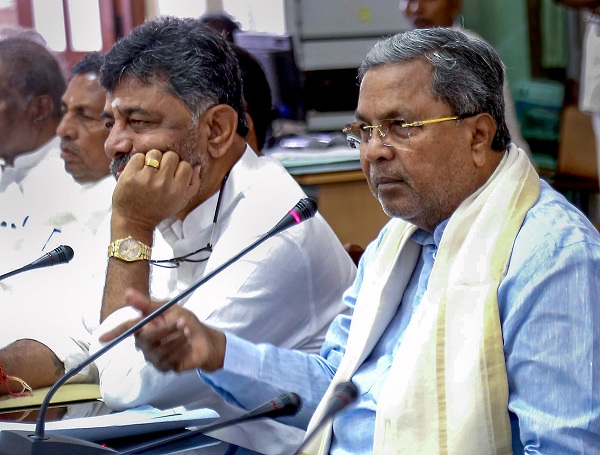Our Special Correspondent
Bengaluru: In a dramatic turn of events, Karnataka Chief Minister Siddaramaiah has refused to step down despite a directive from the Special Court to file an FIR against him. The case, involving alleged misuse of public office in a land acquisition by the Mysuru Urban Development Authority (MUDA), is being overseen by the Mysuru Lokayukta. This controversy has now raised significant questions about political morality and ethics in Karnataka’s governance.
At the center of this issue is the allegation that Siddaramaiah favored his own wife in the land deal. While the legal technicalities remain unresolved, the case has become more about political propriety. As the Lokayukta prepares to investigate, the Chief Minister’s refusal to vacate his seat casts doubt on the possibility of a fair and impartial probe. The investigation, which requires assistance from state police and the Home Ministry, raises concerns about the potential influence Siddaramaiah could wield while remaining in power. Critics argue that his continued leadership poses a direct challenge to the integrity of the judicial process.
Although no court has yet found Siddaramaiah guilty, the broader implications of the case are not lost on the public. India’s legal framework operates on the presumption of innocence until proven guilty, and the Chief Minister, like many other political leaders facing charges, is technically innocent at this stage. However, the perception of power being misused to influence investigations has led to a growing chorus of demands for his resignation, particularly from opposition parties.
The Congress party’s silence on the matter, more than 48 hours after the court’s decision, is equally concerning. This inaction is not just a reflection of indecision but potentially a calculated move by the party’s high command. Siddaramaiah’s primary rival, Deputy Chief Minister DK Shivakumar, has long been seen as waiting in the wings for the top post. Shivakumar had initially agreed to a power-sharing deal, which would see him take over as Chief Minister after two and a half years. Now, with Siddaramaiah embroiled in legal trouble, Shivakumar may see an opportunity to assume power earlier than expected.
Speculation has grown over whether Shivakumar is playing a behind-the-scenes role in intensifying the pressure on Siddaramaiah. Some believe he could be indirectly supporting petitioners or even coordinating with opposition parties to build a stronger case against the Chief Minister. This internal political chess game highlights the fragile alliance within Karnataka’s Congress unit, where loyalty and ambition are constantly at odds. Shivakumar’s careful public posture of unity with Siddaramaiah only adds to the intrigue.
Meanwhile, the opposition BJP-JD(S) alliance has seized on the issue, demanding Siddaramaiah’s resignation on moral grounds. Their argument is that, given the gravity of the allegations and the need for a fair investigation, the Chief Minister’s continued leadership is untenable. The alliance has been vocal in pointing out that with the state police under the control of the government, a truly impartial probe is unlikely. They have called for intervention from the Governor under Article 17A, which could potentially lead to a probe by central agencies like the CBI.
The Congress high command now finds itself in a precarious position. Should they continue backing Siddaramaiah despite the mounting evidence and public outcry, or should they take swift action to preserve the party’s credibility? One option being discussed is a “via media” approach, where the party could persuade Siddaramaiah to resign voluntarily, allowing for a neutral or trusted figure to lead the state temporarily. Such a move would buy time for Congress to regroup without appearing to abandon its leader prematurely.
An alternative strategy could involve senior Congress leader and party president Mallikarjun Kharge stepping in as a temporary Chief Minister. Kharge, a respected leader from Karnataka, could provide stability while maintaining his role in the Rajya Sabha for up to six months. This would give Congress a chance to restore order before facing key state elections in the run-up to the 2029 general elections.
Adding further complexity to the situation is speculation that Priyanka Gandhi Vadra may be elevated to a more prominent leadership role during this period of crisis. Known for her aggressive political style, Priyanka has often drawn comparisons to her grandmother, Indira Gandhi. While her efforts in Uttar Pradesh during the state elections did not yield the desired results, her political acumen is said to be growing, and this turbulent moment could be the perfect testing ground for her leadership on a national scale.
For Congress, the stakes are high. The party leadership must weigh its options carefully, balancing the need to demonstrate accountability with the goal of maintaining unity within the Karnataka Congress. Siddaramaiah’s continued leadership, in the face of serious allegations, could damage the party’s reputation at a time when it can ill afford such a blow. If the Chief Minister chooses to fight the case in the courts, the process could drag on, with the outcome remaining uncertain.
Ultimately, the Congress must decide whether to continue supporting a leader mired in controversy or opt for a strategic leadership change to protect the party’s image. The decision will not only impact Karnataka but could have far-reaching implications for Congress across India. The party’s ability to navigate this legal and political crisis may well shape its fortunes in the years to come.





